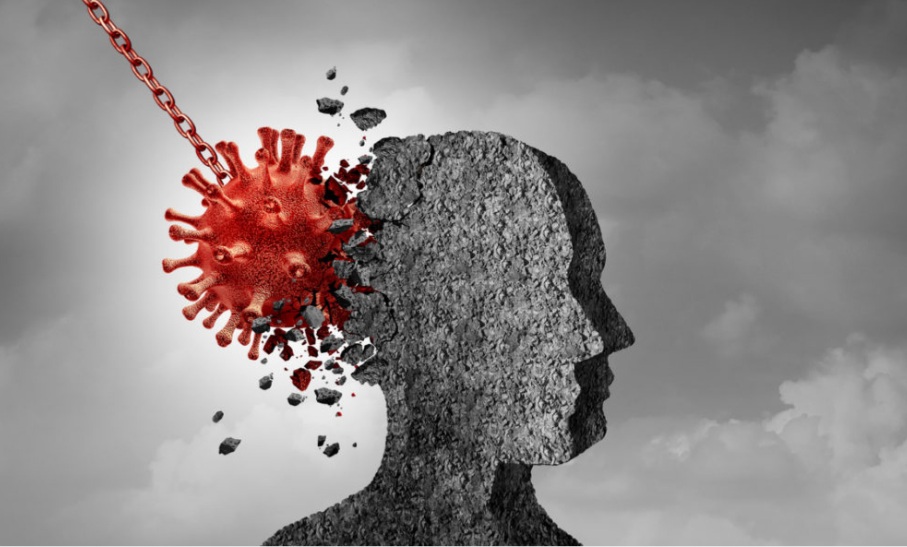By Aaniqa Qayoom
As the COVID-19 pandemic entered its second year, new fast-spreading variants have caused a surge in infections in many countries, and renewed lockdowns. The devastation of the pandemic — millions of deaths, economic strife and unprecedented curbs on social interaction — has already had a marked effect on people’s mental health. Researchers worldwide are investigating the causes and impacts of this stress, and some fear that the deterioration in mental health could linger long after the pandemic has subsided. Ultimately, scientists hope that they can use the mountains of data being collected in studies about mental health to link the impact of particular control measures to changes in people’s well-being, and to inform the management of future pandemics.
The distress in the pandemic probably stems from people’s limited social interactions, tensions among families in lockdown together and fear of illness, etc.
Studies and surveys conducted so far in the pandemic consistently show that young people, rather than older people, are most vulnerable to increased psychological distress, perhaps because their need for social interactions are stronger. Data also suggest that young women are more vulnerable than young men, and people with young children, or a previously diagnosed psychiatric disorder, are at particularly high risk for mental-health problems. “The things that we know predispose people to mental health problems and conditions have been increased as a whole.
The COVID-19 pandemic and the resulting economic recession have negatively affected many people’s mental health and created new barriers for people already suffering from mental illness and substance use disorders. During the pandemic, about 4 in 10 adults in the world. have reported symptoms of anxiety or depressive disorder, a share that has been largely consistent, up from one in ten adults who reported these symptoms from January to June 2019 ,similar kind of trend could be seen in other places of the globe. A Health Tracking Poll from July 2020 also found that many adults are reporting specific negative impacts on their mental health and well-being, such as difficulty sleeping (36%) or eating (32%), increases in alcohol consumption or substance use (12%), and worsening chronic conditions (12%), due to worry and stress over the coronavirus. As the pandemic wears on, ongoing and necessary public health measures expose many people to experiencing situations linked to poor mental health outcomes, such as isolation and job loss.
The COVID-19 pandemic has had a major effect on our lives. Many of us are facing challenges that can be stressful, overwhelming, and cause strong emotions in adults and children. Public health actions, such as social distancing, are necessary to reduce the spread of COVID-19, but they can make us feel isolated and lonely and can increase stress and anxiety. Learning to cope with stress in a healthy way will make you, the people you care about, and those around you become more resilient.
Stress can cause the following:
• Feelings of fear, anger, sadness, worry, numbness, or frustration
• Changes in appetite, energy, desires, and interests
• Difficulty concentrating and making decisions
• Difficulty sleeping or nightmares
• Physical reactions, such as headaches, body pains, stomach problems, and skin rashes
• Worsening of chronic health problems
• Worsening of mental health conditions
• Increased use of tobacco, alcohol, and other substances
It is natural to feel stress, anxiety, grief, and worry during the COVID-19 pandemic. Below are ways that you can help yourself, others, and your community manage stress.
Healthy and effective Ways to Cope with Stress
• Take breaks from watching, reading, or listening to news stories, including those on social media. It’s good to be informed, but hearing about the pandemic constantly can be upsetting. Consider limiting news to just a couple times a day and disconnecting from phone, tv, and computer screens for a while.
• Take care of your body, Take deep breaths, stretch, or meditate, Try to eat healthy, well-balanced meals , Exercise regularly, Get plenty of sleep, avoid excessive alcohol, tobacco, and substance use .Continue with routine preventive measures (such as vaccinations, cancer screenings, etc.) as recommended by your healthcare provider.
Get vaccinated with a COVID-19 vaccine when available.
• Make time to unwind. Try to do some other activities you enjoy.
• Connect with others, Talk with people you trust about your concerns and how you are feeling.
• Connect with your community- or faith-based organizations. While social distancing measures are in place, try connecting online, through social media, or by phone or mail.
Depression for sure is a real thing, in fact as real as is the pandemic itself , therefore we must take it seriously so that it can be effectively dealt with.






